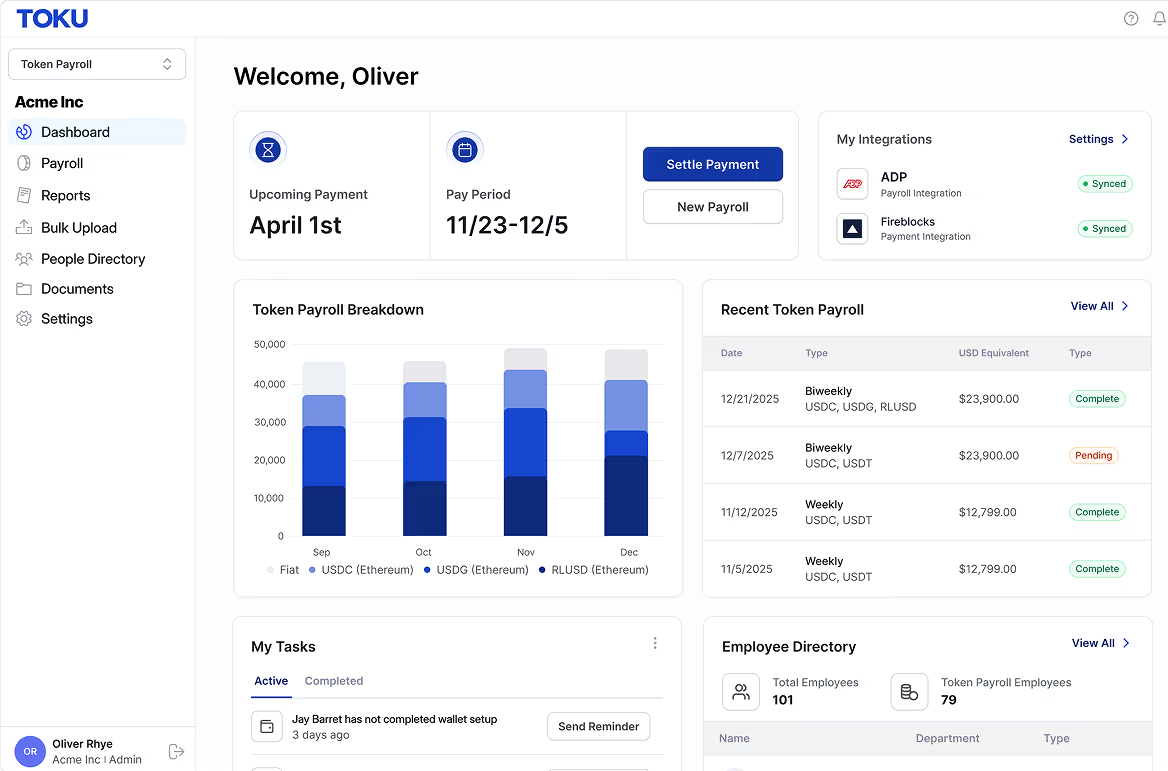Stablecoin Payroll in the United States: Federal and State Compliance Guide for Domestic Crypto Payroll

.avif)
Federal Regulatory Framework
The United States permits stablecoin payroll with proper compliance across multiple federal agencies. Unlike many countries that prohibit crypto payments, the U.S. allows wages in stablecoins when employees consent and tax obligations are met.
The Legal Foundation: Employee Consent
The Fair Labor Standards Act permits non-cash wages when:
- Employees voluntarily accept the payment method
- Fair market value meets minimum wage requirements
- Proper records are maintained
Critical: Employee consent makes stablecoin payroll legal at the federal level. Written agreements must specify voluntary participation and the right to receive USD instead.
Federal Tax Requirements
The IRS treats stablecoins as property, creating specific reporting obligations:
IRS Notice 2014-21 clarifies: "When a taxpayer receives virtual currency as payment for goods or services, the taxpayer must include the fair market value of the virtual currency in computing gross income."
State-by-State Compliance Requirements
Each state maintains unique regulations affecting stablecoin payroll implementation:
States with Clear Frameworks
States Requiring Careful Compliance
Minimum Wage Compliance Across States
Federal and state minimum wages must be met based on USD value at payment time:
State Tax Withholding Requirements
Beyond federal taxes, state requirements vary significantly:
Implementation Requirements by State Category
Category 1: Crypto-Friendly States
States: Wyoming, Texas, Florida, Tennessee, Nevada
Implementation Approach:
- Simple employee consent forms
- Standard federal tax compliance
- Minimal additional requirements
Toku Integration: Streamlined setup with automatic federal compliance
Category 2: Regulated But Permitted States
States: California, Colorado, Arizona, Utah, Georgia
Implementation Approach:
- Detailed employment agreements
- Robust record-keeping systems
- Clear USD alternative options
Toku Integration: Enhanced documentation and dual-payment options
Category 3: Complex Compliance States
States: New York, Illinois, Massachusetts, Connecticut, New Jersey
Implementation Approach:
- Legal review of wage payment laws
- Conservative structuring as benefits
- Comprehensive employee protections
Toku Integration: Advanced compliance modules with state-specific features
Federal Documentation Requirements
Proper documentation ensures compliance across all jurisdictions:
State-Specific Documentation
Additional requirements vary by state:
California: Itemized wage statements showing stablecoin amounts and USD conversions
New York: Paystub requirements including payment method disclosure
Illinois: Semi-monthly payment records with explicit consent documentation
Oregon: Detailed record of hours worked and rates paid in USD equivalent
Practical Implementation Workflow
Implementing compliant stablecoin payroll across multiple states:
Multi-State Employer Considerations
Operating across state lines requires addressing the most restrictive requirements:
Remote Work Complications:
- Employee's state of residence governs
- Tax withholding for multiple states
- Varying payment frequency requirements
Standardization Strategy:
- Adopt most restrictive state's requirements
- Uniform documentation across states
- Centralized compliance monitoring
Integration with Existing Payroll Systems
Toku seamlessly integrates with major payroll providers while maintaining state compliance:
Providers: ADP | Paychex | Paycom | Paylocity | Workday | Gusto | Rippling | TriNet | Insperity | Justworks | Zenefits | BambooHR
State-Specific Features:
- Automatic minimum wage validation
- State tax calculation engines
- Compliant paystub generation
- Multi-state withholding support
Common Federal Compliance Mistakes
State-Specific Pitfalls
Future Regulatory Landscape
Federal and state regulations continue evolving:
Federal Developments:
- Proposed stablecoin legislation in Congress
- IRS guidance updates expected
- DOL modernization of payment rules
State Trends:
- More states clarifying crypto wage laws
- Uniform Law Commission recommendations
- Enhanced consumer protections
Getting Started with Compliant Stablecoin Payroll
Implementing stablecoin payroll across the United States requires navigating federal and state requirements. Toku's compliance engine automatically handles jurisdiction-specific rules.
This guide reflects federal and state regulations as of January 2025. The regulatory landscape for digital assets continues evolving rapidly. Toku's real-time compliance updates ensure your payroll remains compliant as regulations change.

.avif)


